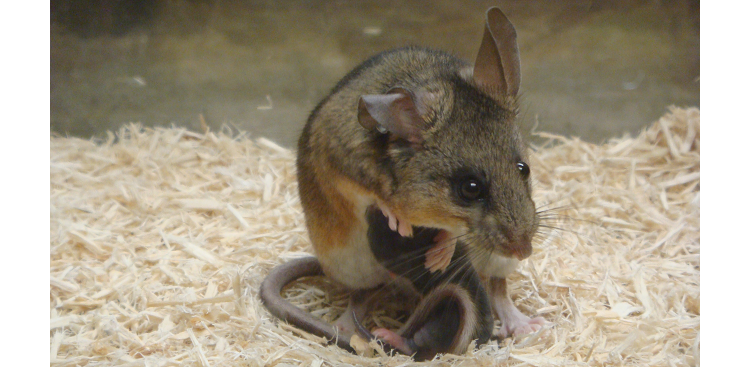Parenting and the Brain
- Published2 Jun 2015
- Reviewed2 Jun 2015
- Author Susan Gaidos
- Source BrainFacts/SfN

Scientists often use mice to study the changes in the brain brought on by parenting. Here, a male mouse nurtures one of his offspring.
Courtesy, with permission: Lambert Behavioral Neuroscience Laboratory, Randolph-Macon College.
As any new parent knows, having a child changes everything. Upon arrival of a newborn, midnight movies and late-morning sleep-ins give way to sleepless nights and around-the-clock feedings and care. Exhausted by the responsibility of caring for a totally-dependent being, parents might miss the subtler changes underway in their lives — namely the changes going on in their brains.
While babies don't come home from the hospital with a personalized care manual, research in animals and humans shows that the brain undergoes biological changes to help juggle the new responsibilities and stress.
Ready for Motherhood
For mammalian mothers the transformation to full-time caregiver begins during pregnancy and continues during the weeks after birth. During this time, the mother’s brain is bathed in a stew of reproductive hormones, including estrogen, oxytocin, and prolactin — priming and reshaping brain areas that contain receptors for the hormones, including areas related to motivation and stress.
One of these areas is the hypothalamus, a brain structure that regulates important body functions like sleep, hunger, and reproductive behavior. An anterior subdivision of the hypothalamus, called the medial preoptic area (MPOA), has been linked to parental care. For example, mice with MPOA lesions don’t engage in typical parenting behaviors like gathering pups into their nest and crouching over them.
In work with pregnant rats, researchers at the University of Richmond found that neurons in this region become larger and more complex as the animals go through pregnancy and approach birth. Findings suggest that reproductive hormones act on the MPOA to stimulate a mothers’ interest in her pups, says study author Craig Kinsley.
Pregnancy hormones also act upon a circuit that controls reactions to stress. This circuit includes the hypothalamus as well as the pituitary and adrenal glands, key organs of the endocrine system. Kinsley has studied this stress system in rats and found that, when new mothers and virgin rats are placed in stressful situations, the mothers display less activity in brain regions that regulate stress and anxiety.
Pregnancy hormones also act on the stress circuit to curtail the brain’s response to certain stress hormones, Kinsley says. As a result, rodent moms are better able to take on new challenges and respond with a richer behavioral repertoire.
“A first-time mother has to engage in a variety of behaviors previously unfamiliar to her,” Kinsley says. In rodents, these behaviors include daunting tasks like facing down predators to protect offspring and leaving her young to forage for food.
Multitasking Moms
Mothers’ brains also sprout new dendritic spines — sites of connections between neurons that allow them to communicate with one another. In 2010, Princeton University researchers counted the number of dendritic spines in a part of the prefrontal cortex — a brain region that is vital to learning, attention, and planning — and found that mother rats had more than virgin rats. This enhancement makes mothers more attentive and less easily distracted, says study author Benedetta Leuner, now with the Ohio State University. The changes also boost a mother’s ability to shift gears when in a situation with two different tasks calling for her attention.
Similar brain changes are also seen in women in the weeks and months after giving birth. In 2010, scientists scanned the brains of new mothers a few weeks after they had given birth and then again about four months later. Over this period, certain parts of the mothers’ brains bulked up, including the prefrontal cortex. The researchers speculated that this increase could be linked to the range of novel experiences a mother has when interacting with her baby.
Family Guy
Pregnant women aren't the only ones dealing with complicated hormones and altered brains. Dads and dads-to-be experience a small, but significant, rise in prolactin and estrogen, the same hormones that spike in pregnant women. After his baby arrives, a father’s testosterone levels drop, a change that may make dad less aggressive and more nurturing.
Neuroscientist Kelly Lambert of Randolph-Macon College studies the biology of paternal behavior in California mice, one of few species in which males take an active caregiver role. She’s found that when compared with bachelor mice, father mice are quicker to learn where food rewards are hidden in a maze. In addition, father mice had increased activity in the hippocampus, an area of the brain involved in learning and memory.
Other studies of the animals’ brains have shown that the nurturing father mice are also wired to care: their brains have enhanced neural fibers that respond to oxytocin and vasopressin, neurochemicals linked to caregiving responses. Such fibers connect to receptors in the skin and transmit information about touch to the brain.
Through such wiring, affectionate contact between father and offspring helps spur the physiological changes seen in dad’s brain — both in rodents and people, says Lambert.
Research in animals and humans has offered insight into the biological changes that help parents juggle their new responsibilities and stress. The novel experience of having offspring is one of the most stimulating experiences for the brain, whether you’re a human or a rat, Lambert says.
“To watch a mother rat, who may have 14 pups, is awe-inspiring,” Lambert says. “They know exactly what to do and they hit the ground running. That’s because something’s going on in their brain.”
CONTENT PROVIDED BY
BrainFacts/SfN
References
Abraham E, Hendler T, Shapira-Lichter I, Kanat-Maymon Y, Zagoory-Sharon O, et al. Father's brain is sensitive to childcare experiences. Proceedings of the National Academy of Sciences. Jul 8;111(27):9792-7 (2014).
Barrett J, Wonch KE, Gonzalez A, Ali N, Steiner M, et al. Maternal affect and quality of parenting experiences are related to amygdala response to infant faces. Social Neuroscience. 7(3):252-68 (2012).
Franssen CL, Bardi M, Shea EA, Hampton JE, Franssen RA, et al. Fatherhood alters behavioural and neural responsiveness in a spatial task. Journal of Neuroendocrinology. Nov;23(11):1177-87 (2011).
Keyser-Marcus L, Stafisso-Sandoz G, Gerecke K, Jasnow A, Nightingale L, et al. Alterations of medial preoptic area neurons following pregnancy and pregnancy-like steroidal treatment in the rat. Brain Research Bulletin. 55(6): 737-45 (2001).
Kim P, Leckman JF, Mayes LC, Feldman R, Wang X, et al. The plasticity of human maternal brain: longitudinal changes in brain anatomy during the early postpartum period. Behavioral Neuroscience. Oct;124(5):695-700 (2010).
Kim P, Rigo P, Mayes LC, Feldman R, Leckman JF, et al. Neural plasticity in fathers of human infants. Social Neuroscience 9(5):522-35 (2014).
Kinsley CH, Blair JC, Karp NE, Hester NW, McNamara IM, et al. The mother as hunter: significant reduction in foraging costs through enhancements of predation in maternal rats. Hormones and Behavior. Sep;66(4):649-54 (2014).
Kinsley CH, Trainer R, Stafisso-Sandoz G, Quadros P, Marcus LK, et al. Motherhood and the hormones of pregnancy modify concentrations of hippocampal neuronal dendritic spines. Hormones and Behavior. Feb;49(2):131-42 (2006).
Leuner B, Gould E. Dendritic growth in medial prefrontal cortex and cognitive flexibility are enhanced during the postpartum period. Journal of Neuroscience. Oct 6;30(40):13499-503 (2010).
Love G, Torrey N, McNamara I, Morgan M, Banks M, et al. Maternal experience produces long-lasting behavioral modifications in the rat. Behavioral Neuroscience. Aug;119(4):1084-96 (2005).
Wu Z, Autry AE, Bergan JF, Watabe-Uchida M, Dulac CG. Galanin neurons in the medial preoptic area govern parental behavior. Nature. 509(7500): 325-330 (2014).
Also In Diet & Lifestyle
Trending
Popular articles on BrainFacts.org


















